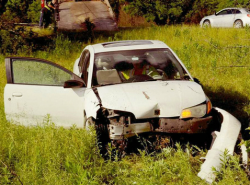— A General Motors ignition switch lawsuit in a Manhattan federal court is underway in a case that pits a 49-year-old Oklahoma postal worker against GM. Filed by Saturn Ion owner Robert Scheuer, the lawsuit could pave the way for five ignition switch lawsuits waiting in line.
Scheuer says he was driving his 2003 Saturn Ion on May 28, 2014, when he was run off the road by another driver, causing the Ion to crash into two trees. Scheuer says the airbags didn't deploy because a defective ignition switch caused the car to lose power to the airbags.
Represented by attorney Bob Hilliard, who has experience facing GM in court, Scheuer claims he suffered back and neck injuries because the airbags failed to deploy.
Admitting GM has been far from perfect and made mistakes and errors, GM attorney Mike Brock questioned everything about Scheuer's claims.
Concerning the accident, Brock said the evidence shows Mr. Scheuer might not have been run off the road as he claims because investigators determined the car slowly ran off the road as if the driver fell asleep, not in the way a car would act if forced off the road by another driver.
Scheuer says he was unconscious for about three hours in his wrecked car waiting for someone to find the car. However, Brock pulled AT&T phone records that proved Scheuer placed two calls to his voicemail while allegedly inside the crashed car. Brock said this is the same time the plaintiff alleges he was suffering from severe injuries sustained in the crash.
Scheuer says he has no memory of events from that day and said he doesn't remember making calls to his voicemail at the same time he was supposed to be injured and unconscious.
Although Scheuer alleges the crash caused him severe back and neck injuries, Mr. Brock said he wasn't buying it because records show Scheuer complained of back problems for years before the crash. Mr. Brock claims between 2005 and 2015, Scheuer continually complained about back pain and had surgeries long before the crash.
Scheuer admitted he suffered from back and neck pain before the accident, but he says the pain has been more severe after the crash.
Brock also attacked Scheuer's use of painkillers going back to 2005. Brock wanted Scheuer's use of painkillers to be included in the trial evidence, but the judge denied that request by saying GM could not say the accident was caused by the medication.
However, the judge allowed Brock to question Scheuer about his history of using painkillers. Scheuer admitted he was prescribed the same amount of painkillers a year after the accident as he was before the crash, something Brock said indicates the back problems were no more severe after the crash.
Mr. Scheuer also says he was planning on buying a home before the crash, but injuries sustained in the accident dashed those hopes because he couldn't get financing. Mr. Brock countered by showing the jury evidence that Scheuer had over $400,000 in a retirement account, plenty of money to buy a house.
As for the ignition switch in the Ion, Brock said Scheuer was sent a letter three months before the accident that gave instructions to use just a single key in the ignition switch, advice that Scheuer followed. Mr. Brock says the fact a single key was the only thing attached to the ignition switch means the switch did not move out of the "run" position.
Furthermore, Scheuer says he has no reason to believe the car didn't have power steering and power brakes when the car went off the road, something GM says proves the ignition switch was working correctly.
As for the car being part of the recall of millions of cars, there had been a recall notice sent to Scheuer about the ignition switch on his 2003 Saturn Ion and he had talked to a dealership about the matter, but he hadn't taken the car in for repairs. Unfortunately, investigators couldn't examine the switch because the Saturn Ion was destroyed after the crash.
But the real meat of the case is about the airbags, which clearly did not deploy in the crash. Scheuer claims the airbags failed because the defective ignition switch moved out of the "run" position and caused a loss of power to the airbags.
Mr. Scheuer says he wouldn't have suffered such serious injuries if the airbags would have deployed. However, GM says the airbags didn't fail at all because they weren't designed to deploy in a crash like that in the first place.
Plaintiff attorney Hilliard said its a farce for GM to say the airbags weren't supposed to deploy in the crash because the impact from the crash was so severe that tree bark was wrapped inside the bumper. Hilliard said the fact Scheuer was airlifted to the hospital and later needed spinal surgery is proof of the severity of the crash.
The Scheuer trial continues in New York and is the first of six ignition switch trials scheduled this year which includes over 1,000 people.

